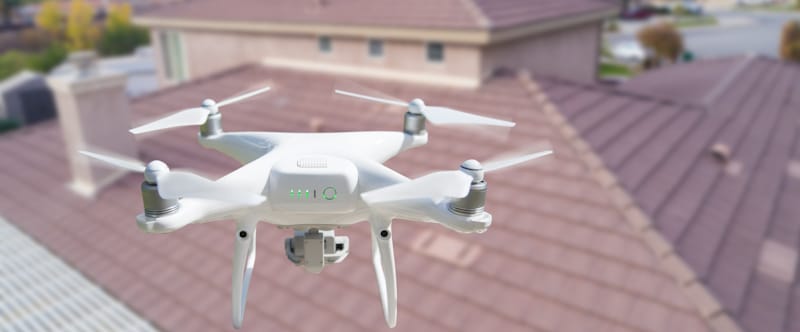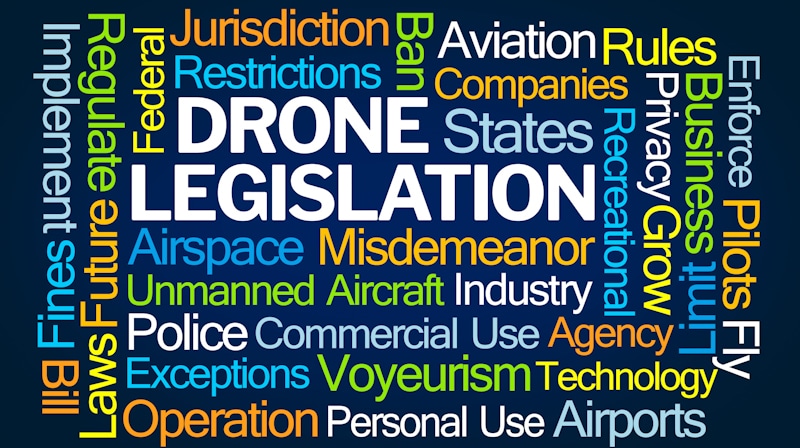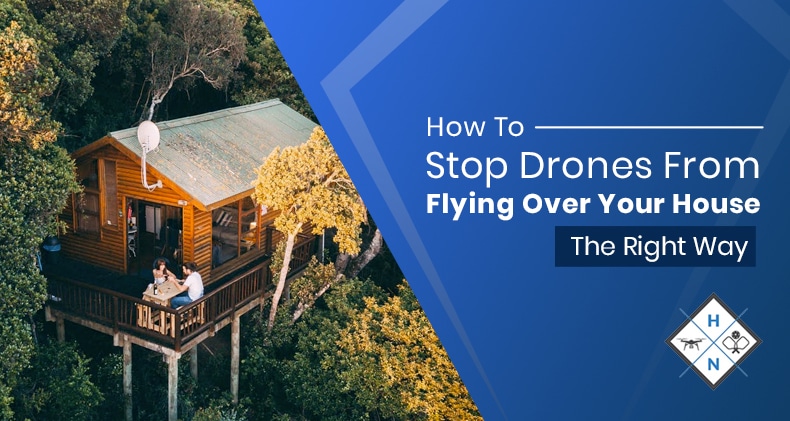In some cases, the presence of a drone around your house may be unintentional on the part of the operator but in other cases, the drone may be entering your property zone with the purpose of breaching your privacy – that is, to spy on you. With many drone models equipped with cameras, it can be too easy to take photos and videos of your house and its residents without your permission.
To stop a drone from flying over your house the first step is to remain calm, do your research on how the state law protects you before acting. Another step is to find out who is the person flying it and inquire about their registration.
Drones have transformed the way we see and film things. They have become one of the most useful gadgets in fields such as photography, film, art, agriculture, construction, insurance, mining, and delivery, among others. Suffice it to say that the hype about drones is real and well-deserved. Unfortunately, with every gadget invented, someone is always bound to find a questionable use for it. This is true with drones. With their capacity to fly, hover, and capture images, drones can also pose a potentially serious risk to privacy and security.
There are also questions about what you can and cannot do in case you discover that a drone has entered your property. Some homeowners, for example, resort to more drastic means of eliminating drones by destroying them. While this may seem like a reasonable approach, it is by no means legal. Very often, homeowners who are not aware of their rights and what they could do to protect themselves are left vulnerable to other people's careless and malicious actions.
If you have ever been in a situation where you felt vulnerable because of the presence of a drone over your house, you need to know about the right steps you need to take. This is to protect yourself and your property against harm and to preserve your privacy.

How to Stop Drones From Flying Over Your House
First, it is important that you understand the laws and regulations regarding the use of drones so you know exactly what you can do to protect yourself in case one does fly over your house. There are regulations that cover the use of flying drones. For one, an individual who purchases a drone that weighs at least 250g or 8.8 ounces must have an FAA identification number. To obtain this number, the user must register the drone in their name. The ID is active for three years, after which it has to be registered again.
There is a caveat, however. Many drone models are very affordable and the FAA does not actively regulate their use. Only in cases where the use of the drone is related to commercial activity or aviation will FAA step in. Hobby drones are also allowed to be flown at night as long as they have lights on. This will help anyone on the ground to see where the drones are going and how high they are. What they do once they are airborne will depend largely on what their operators' intentions are.
As to the question of whether drones can fly over anyone's home or property, the answer, unfortunately, is yes. Individual/Private property lines are referenced only from the ground and not extended into the air above it. In short, the air above your home is public space, which means a drone can fly over your property without your permission.
What About Privacy?
Here's where the issue of privacy can get tricky – homeowners do not actually have an expectation of privacy even when they are within the parameters of their property as long as they are outdoors in open space. That means you could be lounging in your backyard or doing your gardening and a drone can still legally fly over your property. Worse, it could even record you in your very own backyard.
What are you supposed to do to protect yourself? Use this approach to ensure that you do the right thing:
Know what drones are
The National Transportation Safety Board considers drones as aircraft. As such, they are to be protected. This type of protection means that no one has the right to shoot down a drone while it is airborne in the same way that it is illegal to shoot down an airplane. The act of shooting down a drone can be prosecuted under federal law. Hitting a drone or shining a laser at a drone is also prohibited because of this law.
Shooting down a drone is also a bad idea because a spark could ignite its battery. Drones that are powered by lithium polymer could catch fire if shot. If it lands on a house or property (yours or someone else's), it could start a fire and cause damage.
Violation of the law regarding drones is punishable either by a fine or by jail time. Furthermore, the owner of the drone could sue for damage to their gadget, which is their property. Keep in mind that what you are prohibited to do to an aircraft, you are prohibited to do to a drone, especially if it is airborne and even if it is over your property.

Understand How State Law Protects You
Certain states already have laws in place regarding the use of drones. In Arkansas, for example, using drones for video voyeurism and/or to invade privacy is prohibited. In Florida, drones cannot be used for surveillance if it breaches a person's reasonable expectation of privacy. In Nevada, weaponizing a drone is prohibited, while California prohibits the use of drones to observe or document an individual without their consent.
You could find out if your state has drone laws and how your rights are protected by searching online. You may also use this link for reference: https://uavcoach.com/drone-laws/.
Stay Calm
If you observe a drone over your house, do not overreact. Anger will only escalate tensions and likely cause trouble. This is also important if you want to be able to think straight and avoid becoming involved in a criminal act. If the drone is bothersome, document it to use as evidence later. Remember that some actions may be unintentional. Your neighbor or the operator of the drone may simply be flying his/her aircraft without noticing that it has breached your property. This usually happens in fenceless neighborhoods. The key is to assume innocence first. Guilt can be proven later using evidence and facts.
Find Out Who Owns the Drone
If a drone is flying over your house, you might want to consider if it just happened to pass by on its way elsewhere. It may not be flying over your house to spy on you or capture images. Once you figure out that a drone is actually spying on you, then you will have to find out who the owner of the drone is. Drones have a limited flight range, so the user/operator is likely nearby, which means it is possible to locate them.
Once you find them, you may have to talk to them and ask them not to fly over to your house. Most people are willing to compromise within reasonable terms. You may also consider calling or sending an e-mail. E-mails can be considered as documentation of your actions and may be a valuable piece of supporting evidence later.
Note How the Drone is Being Flown
Drones are controlled by remote, so the way it flies, where it is headed, and how fast it is going are all due to the decisions of the user/operator. If a drone is being flown recklessly over your house, record it immediately, then talk to the owner directly.
If the drone crashes or causes damage, call 911 immediately but do not engage the owner. The FAA does have a hotline but in most cases, they often ask local law enforcement to deal with the matter.
Get the Authorities Involved
If asking the operator not to fly their drone over your house does nothing, you can inform law enforcement. This is a good move if the drone frequently flies over your property, is hovering, or is low enough – that is, at the level of a treetop. You are protected by Peeping Tom and nuisance laws that help preserve your privacy.
Low-flying drones present a danger to those within proximity, whether human or animal because of their propellers. Although drone propellers are designed with guards to increase their safety, the blades could still cause serious injury if it hits sensitive parts of the body such as the face, eyes, or fingers. If you have drones that fly low over your house, you can have the authorities involved.
Drones that hover and linger over your property, especially near doors or windows are also reason enough to call the police. It would also help if you can record the incident/s on video as evidence.
You should also learn about aerial trespass. This occurs when aircraft, such as drones, are flown over your property in a way that substantially interferes with your use and enjoyment of your house or property. The perimeters within which the immediate reaches of the space above a house or backyard has yet to be clearly established by law. For now, however, homeowners must remain vigilant about what they can honestly and reasonably suspect as interference. After all, people do not exactly want to change how they behave within their own properties.

Consider a Private Cause of Action
Let's say you have spoken to, called, e-mailed, or made other reasonable requests to the operator of the drone regarding your concerns and yet, your requests are still being ignored. If this happens, you might want to file a private cause of action for either personal nuisance or trespass, whichever case applies to you. It will help your case significantly if you can present evidence regarding the actions of the drone operator.
Note, however, that simple disputes such as these may take more time and effort, considering that you will be going to court. If this seems like an impractical approach to you, there are other approaches you might want to consider.
Let Your Intentions Be Known
Consider posting a sign over your property that prohibits drones. A notice that states that you do not permit drones to be flown over your house is an explicit expression of your wishes and intentions. The sign must be visible enough from several feet above and must be posted in a location where it can be reasonably seen, such as on the roof, the top of a tree, or the highest point of the house, such as the attic or chimney.
If, in spite of this notice, someone still repeatedly flies over your house at low altitudes, you can then get the authorities involved or go to court. The person using the drone may still fly over your property but at least, they will know better than to fly low or linger.
When Can You Knock Down a Drone?
There are certain cases when you can reasonably knock down a drone that is flying over your property. If it is flying so low that it is about to crash into a person, animal, or part of the house that will likely become damaged as a result of contact, you may have to do what you need to do to protect yourself.
The act of knocking down a drone that is presenting a danger to the life and limb of a person or animal is considered justified. Keep in mind that all states recognize a citizen's right to protect and defend himself from imminent harm or danger. However, the part as to what constitutes "imminent" harm or danger can only be supported by evidence and facts. Note that presumption of harm, whether physical, emotional, or mental (as in the case of the possibility of being spied on), does not justify intentional action on the part of the homeowner to knock down or damage the drone.
It is also important to learn to distinguish recreational drones from commercial drones. Commercial drones are permitted to fly as part of the owner's/operator's conduct of business. As such, they are protected by law as well.
Using Firearms Against a Drone
It might be tempting to end the problem of an annoying drone by shooting it down. However, using firearms also poses a safety issue not just to human life but also property. Shooting and hitting a drone will damage it, which means the owner could sue you for damages. If a drone is flying over your house and you can reasonably suspect spying or nuisance, then call 911.
Using Technology
There are products in the market that allow you to disable a drone that is flying over your property. One of these is the anti-drone jammer which jams the signals to the drone and interrupts its frequency. This effectively overrides the drone and keeps it from the control of the operator.
Now here's where it can get tricky: using jammers may be prohibited or even illegal in your locality or state. In fact, the user of the jammer is required to have a license under the rules of the Commission on the 1934 Communications Act. Drone jammers, after all, are radio transmitters, and using them is also considered a type of hacking – an act that is considered illegal by the Criminal Code in the U.S.

Using a jammer can also potentially disable the drone and cause it to lose control or crash, which could lead to injuries or property damage. Drone jammers can also potentially affect the frequency of nearby devices, which can, in turn, cause disruption and inconvenience in public settings, including highways and airports. Unauthorized drone jamming can and does carry heavy penalties when used without permission. The technology is also regulated by the government, so their use is severely limited.
The same is true with other drone-related technology such as drone-blinding lasers. The digital camera built into the drone detects light from the laser but since the light is intense, it can effectively "blind" the drone. Even if you are accurate in your aim, you still should not use lasers to point them at the sky. It is considered illegal and potentially dangerous in case a manned aircraft happens to be passing by. The light from the laser could blind the pilot and cause an accident.
Making the Right Decisions
Having drones fly over your house or property is a nuisance, especially if the drone is loud enough to disrupt the peace and quiet you should be enjoying.
Although there are times when the drone passing overhead is simply a recreational drone that a neighbor is innocently flying, you may be within reason if you see that a drone is becoming a nuisance or is evidently spying on you. Know that there are privacy laws that protect you and your property against drones. These laws, however, vary considerably depending on the state where you reside, particularly regarding the kind of actions that a drone is prohibited from performing.
Knowing the laws in your state will help you come up with a plan regarding the right steps to take to ensure that your house, property, and person are protected. It will also help you determine the best course of action that keeps you within legal bounds. If you are in doubt, best to call the authorities. Thanks to their usefulness and convenience, drones are likely here to stay. With the right information in your hands, you will be able to make an informed decision that protects your rights but does not infringe on others.
Shawn Manaher loves to play with new toys and dive into new hobbies. As a serial entrepreneur, work definitely comes first but there is always room for hobbies.

